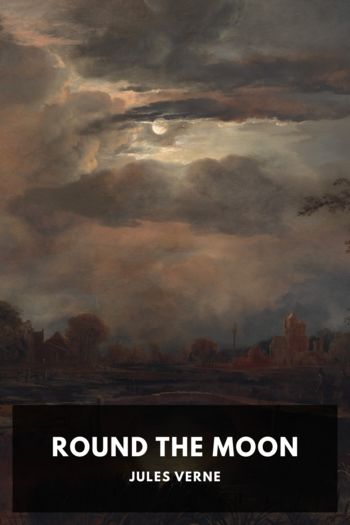Topsy-Turvy by Jules Verne (best book recommendations .txt) 📕

- Author: Jules Verne
Book online «Topsy-Turvy by Jules Verne (best book recommendations .txt) 📕». Author Jules Verne
Complete silence. Nobody would answer, show your pocketbook. Empty their pockets into the safes of a syndicate. Make known in advance how much each country would bid at the sale. No haste was shown. And if there should be a disagreement in this new-formed syndicate in the future, and circumstances should compel each one to make his own bids? And should the diplomat Karkof feel insulted at the trickery of Jacques Jansen, who would be insulted at the underhand intrigues of Jan Harald, who would refuse to support the high pretensions of Major Donellan, who, himself, would not stop to embroil each one of his associates. And now to show their credits-that was showing their play, when it was necessary to live up to it. There were really two ways only to answer the proper but indiscreet suggestion of Dean Toodrink. Either to exaggerate the credits, which would be very embarrassing, because it would then be the question of the payment, or to diminish them to such a point that they would be ridiculous and not to the purpose of the scheme. The ex-counsellor had this idea first, but it must be said to his credit, he did not seriously hold it. His colleagues, however, followed suit. “Gentlemen,” said Holland, through its mouthpiece, “I regret, but for the purpose of the Arctic regions I can only dispose of fifty riechsthaler.” “And I of thirty-five rubles,” said Russia. “And I of twenty kronors,” said Norway-Sweden. “And I of fifteen cronen,” said Denmark. “Well,” said Major Donellan, in a tone well befitting the disdainful attitude so common and natural to the English character, “then it would be better that you make the purchase, gentlemen, as England can only put up at the most one shilling and sixpence.” And with this ironical remark the conference of the delegates of old Europe was at an end.
In Which the Arctic Regions Are Sold at Auction to the Highest BidderWhy was this sale on the 3rd of December going to be held in the regular auction hall, where usually only such objects as furniture, utensils, tools, instruments, etc., or art pieces, pictures, medals, and antique objects were sold? Why, so long as it was a piece of realty, was it not sold before a referee or a court of justice appointed for such sales? And why was the aid of a public auctioneer necessary when a part of our globe was going to be sold? How could this piece of the world be compared with any movable object when it was the most fixed thing on the face of the earth? Really, this seemed to be quite illogical, but it was not so, since the whole of the Arctic regions was to be sold in such a way that the contract would be valuable. Did this not indicate that in the opinion of the N.P.P.A. the immovable object in question contained something movable?
This singularity puzzled even the most eminently sagacious minds to be found in the United States. On the other hand, there had been such a sale in the past already. One portion of our planet had been sold in the auction-rooms with the help of a public appraiser to the highest public bidder. And this case had happened in America.
It was some years before, in San Francisco, CA, an island of the Pacific Ocean, Spencer Island, was sold to the rich William W. Kolderup, who bid $500,000 in opposition to J. R. Taskinar, of Stockton. This island had cost $4,000,000. It is true it was an island which had inhabitants, only a few miles away from the coast, with forests, water, productive and solid, with fields and prairies, in condition to be cultivated, and not a vague wild region of water covered with eternal ice, defended by impenetrable icebergs, which very probably nobody would ever live in. It was thought, therefore, that the unknown polar region would never bring so high a price if sold at auction. Nevertheless, on the day of the sale a great many serious and curious people assembled to learn the end of the affair.
The sale could hardly fail to be interesting.
Ever since their arrival in Baltimore the European delegates had found themselves very much gazed at and always surrounded by many people. Of course they were much interviewed. In view of all this it was only natural that the public of America should have become very much excited. One manner of expressing the public excitement, very characteristic of Americans, was to make bets upon the result, an example which Europe quickly began to follow. Divided as the American citizens were into those of New England, those of the Middle States, Western States, and Eastern States, there was only one wish, and that was for the well-being of their country. But there was still a great deal of uncertainty. It was neither Russia, nor Sweden, nor Norway, nor Denmark, nor Holland, the chances of which they dreaded most. But it was England, with its territorial ambitions, with its only too well-known tendency to swallow everything, and its world-known Bank of England notes. Large sums of money were placed on the result. Bets were made on America and Great Britain, the same as on racehorses, and in almost all cases even money was put up. Some offers were made of 12 and 13½ to 1 on Denmark, Sweden, Holland and Russia, but none would take such an offer.
The sale commenced at 12 o’clock.
Since early in the morning all business had been stopped in the street on account of the large crowd. By telegraph the papers were informed that most of the bets made by Americans had been taken up by





Comments (0)